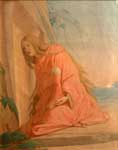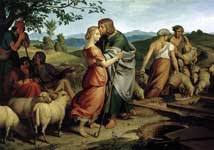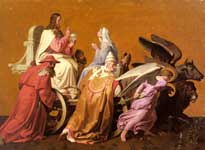Joseph von Führich
Paintings

God writes for Moses on Mount Sinai the Ten Commandments on two stone tablets
Waldesruh. Madonna with child Saint Adelheid and Saint Francis
Jacob Encountering Rachel with her Father's Herds
Temptation of Saint Gudula
Moses in prayer with Aaron and Hur on the Mountain Horeb
Vision of the inhabitants of Jerusalem before the conquest of the city by Antiochus IV Epiphanes



Jacob Encountering Rachel with her Father's Herds

Drawings
The Good Shepherd

Godfrey of Bouillon in the Holy Sepulchre in Jerusalem

----
Fine Art Prints | Greeting Cards | Phone Cases | Lifestyle | Face Masks | Men's , Women' Apparel | Home Decor | jigsaw puzzles | Notebooks | Tapestries | ...
----
Joseph von Führich [or Josef Ritter von Führich] (February 9, 1800 – March 13, 1876) was an Austrian painter, one of the Nazarenes. Führich became a pupil at the Academy of Prague in 1816. His first inspiration was derived from the prints of Dürer and Peter von Cornelius' illustrations to Goethe's Faust, and the first fruit of this turn of study was the Genofeva series. Führich was an adherent of the Nazarene movement, a romantic religious artist who sought to restore the spirit of Dürer and give new shape to biblical subjects. Without the power of Peter von Cornelius or the grace of Johann Friedrich Overbeck, he composed with great skill, especially in outline. His mastery of distribution, form, movement and expression was considerable. In its peculiar way his drapery was perfectly cast.
Essentially creative as a landscape draughtsman, he had no feeling for colour; and when he produced monumental pictures he was not nearly so successful as when designing subjects for woodcuts. Führich's fame extended far beyond the Austrian capital, and his illustrations to Tieck's Genofeva, the Lord's Prayer, the Triumph of Christ, the Road to Bethlehem, the Succession of Christ according to Thomas a Kempis, the Prodigal Son, and the verses of the Psalter, became well known. His "Prodigal Son", especially, is remarkable for the fancy with which the spirit of evil is embodied in a figure constantly recurring, and like that of Mephistopheles exhibiting temptation in a human yet demoniacal shape.[1]
In 1831 he finished the "Triumph of Christ", later in the Raczynski palace at Berlin. In 1834 he was made custos and in 1841 professor of composition in the Academy of Vienna. After this he completed the monumental pictures of the church of St Nepomuk, and in 1854–61 a vast series of wall paintings which cover the inside of the Lerchenfeld church at Vienna. In 1872 he was pensioned and made a knight of the order of Franz Joseph; 1875 is the date of his illustrations to the Psalms.[1]
Führich died in Vienna. His autobiography was published in 1875, and a memoir by his son Lucas in 1886.[1]
Notes
Regarding personal names: Ritter is a title, translated approximately as Sir (denoting a Knight), not a first or middle name. There is no equivalent female form.
References
Encyclopædia Britannica,1911
Sutter, Christiane (2012). Die Kreuzfahrerrezeption in der deutschen Malerei des 19. Jahrhundert. Münster: LIT. p. 51. ISBN 9783643114709.
Sources
This article incorporates text from a publication now in the public domain: Chisholm, Hugh, ed. (1911). "Führich, Joseph von". Encyclopædia Britannica (11th ed.). Cambridge University Press.
Artist
A - B - C - D - E - F - G - H - I - J - K - L - M -
N - O - P - Q - R - S - T - U - V - W - X - Y - Z
Retrieved from "http://en.wikipedia.org/"
All text is available under the terms of the GNU Free Documentation License








